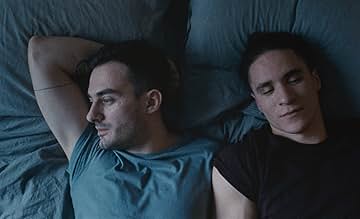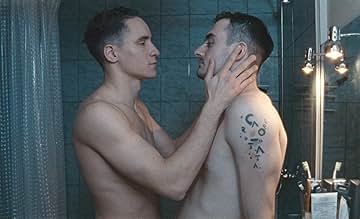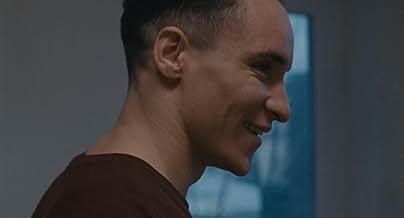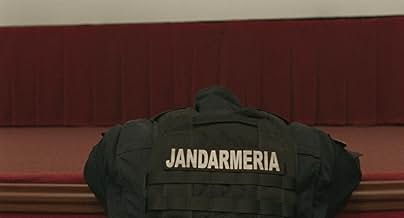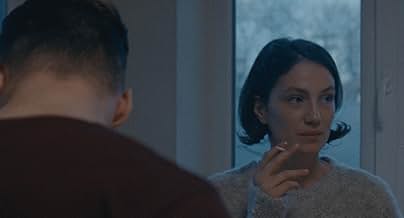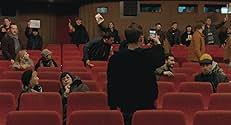IMDb-BEWERTUNG
6,1/10
1600
IHRE BEWERTUNG
Der junge Polizist Cristi versucht, das Gleichgewicht zwischen zwei gegensätzlichen Teilen seiner Identität zu finden: dem eines Mannes, der in einem machohaften, hierarchischen Umfeld arbei... Alles lesenDer junge Polizist Cristi versucht, das Gleichgewicht zwischen zwei gegensätzlichen Teilen seiner Identität zu finden: dem eines Mannes, der in einem machohaften, hierarchischen Umfeld arbeitet, und dem eines verschlossenen Schwulen.Der junge Polizist Cristi versucht, das Gleichgewicht zwischen zwei gegensätzlichen Teilen seiner Identität zu finden: dem eines Mannes, der in einem machohaften, hierarchischen Umfeld arbeitet, und dem eines verschlossenen Schwulen.
- Regie
- Drehbuch
- Hauptbesetzung
- Auszeichnungen
- 14 Gewinne & 35 Nominierungen insgesamt
Empfohlene Bewertungen
Great portrayal of a day and a night in the life of Cristi, a gendarme of Bucharest. The acting of the main actor Conrad Mericoffer, as well as that of the other policemen is one of truly high quality. On the contrary, except for the scene with the sister, I did not appreciate particularly Radouan Leflahi's (Hadi) performance, although the dialogues were written with accuracy, especially in their attempt to reproduce the silly "empty" talk of two lovers (coming from different countries).
The first part is to be appreciated also for the way in which the contrast between the two different mindsets of the protagonists are described. On the one hand Hadi, who quite naively fails to understand the complexity of the world Cristi lives in, and, on the other hand, Cristi, who shows a maybe too cautious attitude towards life, discretion and circumspection being his mottos.
The second part of the movie is absolutely worth watching: the anxiety Cristi feels while being kept out from the discussion going on outside the film theatre is conveyed through some quite long takes, during which Cristi's emotions hit him like waves, alternatively calming down and taking over again. The - partially unjustified - terror of losing his place in his comfort zone leads Cristi to commit an act of violence, the consequences of which will be dealt with by the fellow gendarmes with typical mafiaesque methods.
Much worthier watching than the (only superficially) German equivalent "Freier Fall".
The first part is to be appreciated also for the way in which the contrast between the two different mindsets of the protagonists are described. On the one hand Hadi, who quite naively fails to understand the complexity of the world Cristi lives in, and, on the other hand, Cristi, who shows a maybe too cautious attitude towards life, discretion and circumspection being his mottos.
The second part of the movie is absolutely worth watching: the anxiety Cristi feels while being kept out from the discussion going on outside the film theatre is conveyed through some quite long takes, during which Cristi's emotions hit him like waves, alternatively calming down and taking over again. The - partially unjustified - terror of losing his place in his comfort zone leads Cristi to commit an act of violence, the consequences of which will be dealt with by the fellow gendarmes with typical mafiaesque methods.
Much worthier watching than the (only superficially) German equivalent "Freier Fall".
This is a brave and poignant movie. It is very simple in its pace and setting and could easily be set for a play.
We know from Polish and Georgian movies that it's very complicated to be openly gay in Eastern European countries. Poppy Field is another illustration of this fact.
Cristi is no hero and no victim. As many closeted gay men, he is caught up in his contradictions and spends a lot of time and energy lying to himself and to the others around him. But you can only maintain the façade for so long, and then cracks start to show. The path to authenticity seems like a crucifixion, and the homophobia expressed in the movie is closely associated with Christianism.
My favorite scene is when Cristi is left alone in a red, empty movie theater. We can feel the tempest going on in his skull. His career, his privacy, his life are all at stakes in one day.
A great movie about resilience, bad faith, and sexual minorities.
We know from Polish and Georgian movies that it's very complicated to be openly gay in Eastern European countries. Poppy Field is another illustration of this fact.
Cristi is no hero and no victim. As many closeted gay men, he is caught up in his contradictions and spends a lot of time and energy lying to himself and to the others around him. But you can only maintain the façade for so long, and then cracks start to show. The path to authenticity seems like a crucifixion, and the homophobia expressed in the movie is closely associated with Christianism.
My favorite scene is when Cristi is left alone in a red, empty movie theater. We can feel the tempest going on in his skull. His career, his privacy, his life are all at stakes in one day.
A great movie about resilience, bad faith, and sexual minorities.
The film threatened to be one of those two-parters that quickly slide into boring irrelevance. All the elements were there, the closeted Romanian guy, his Kabylie boyfriend from France and a fleeting visit from a nosey sister who thought her brother was going through a "gay phase".
The two lovers are happy together but there are problems. Hadi wants to go out and about but closeted Cristi wants to keep their relationship, indeed Hadi's existence, under wraps. We are not aware of Cristi's job during the scenes in the flat where the two guys are staying so his reluctance to risk an outing (in both senses of the word) is difficult to understand. Even when the film moves unobtrusively to Cristi's work, we are not sure what it is as the shots showing him do not at first reveal his gendarme uniform.
The unit is going to a cinema whose showing of a film about lesbians has been disrupted by a load of nationalistic god-botherers. Although both the police and the gendarmes try to appear neutral on the surface, when they feel they are not being overheard they make hateful and homophobic statements, Cristi included.
One of the gay guys implies that he will reveal Cristi's orientation leading to a confrontation that is only solved by long negotiations with the cops.
This much is revealed in the storyline provided by IMDB so not a spoiler.
Cristi feels that this is a disaster and we watch his feeling of doomed terror for the rest of the film.
The cleverness of the film was to concentrate on the dynamic at work rather than that of the relationship. Relationship films have been done to death. However, films whose gay characters interact in a macho and illiberal environment such as the police or gendarmerie have not.
Conrad Mericoffer played a good role as Cristi, a man who senses that his life is spinning out of control. He well portrayed the increasing desperation of the character needing to know the results of the confrontation. He was convincing in the earlier, tender scenes with lover Hadi and just as real in his role as macho man conforming to canteen culture.
The film was a compact eighty minutes long and was just right. We are left with a final comment from his boss that might mean something or might not. Had all the cover up that Cristi had maintained over his life at work been rent away? We shall never know.
The two lovers are happy together but there are problems. Hadi wants to go out and about but closeted Cristi wants to keep their relationship, indeed Hadi's existence, under wraps. We are not aware of Cristi's job during the scenes in the flat where the two guys are staying so his reluctance to risk an outing (in both senses of the word) is difficult to understand. Even when the film moves unobtrusively to Cristi's work, we are not sure what it is as the shots showing him do not at first reveal his gendarme uniform.
The unit is going to a cinema whose showing of a film about lesbians has been disrupted by a load of nationalistic god-botherers. Although both the police and the gendarmes try to appear neutral on the surface, when they feel they are not being overheard they make hateful and homophobic statements, Cristi included.
One of the gay guys implies that he will reveal Cristi's orientation leading to a confrontation that is only solved by long negotiations with the cops.
This much is revealed in the storyline provided by IMDB so not a spoiler.
Cristi feels that this is a disaster and we watch his feeling of doomed terror for the rest of the film.
The cleverness of the film was to concentrate on the dynamic at work rather than that of the relationship. Relationship films have been done to death. However, films whose gay characters interact in a macho and illiberal environment such as the police or gendarmerie have not.
Conrad Mericoffer played a good role as Cristi, a man who senses that his life is spinning out of control. He well portrayed the increasing desperation of the character needing to know the results of the confrontation. He was convincing in the earlier, tender scenes with lover Hadi and just as real in his role as macho man conforming to canteen culture.
The film was a compact eighty minutes long and was just right. We are left with a final comment from his boss that might mean something or might not. Had all the cover up that Cristi had maintained over his life at work been rent away? We shall never know.
It is scary to see the Romanian reality that some of us know so well displayed on screen in such strong tones. For me, being a victim of a similar assault as portrayed in the movie, it was familiar and disturbing, at the same time. I commend the creators of this movie for their courage. The Romanian society still is exactly as we see it on screen.
Maybe, the naked realism remains the basic virtue of this film . A form of realism defined first by language. I suppose, only a Romanian can understand, in real and proper manner, the entire pressure of situations, language, dialogue .
A jandarm and an intervention in a delicate case.
A presumed ex-boyfriend recognize him and having the foulish inspiration to remind to him the past. And the brutal, for me not exactly illegitimate, reaction of jandarm. The rest is the expectation of Cristi about the decision of his supperiors about the violence act of him.
At the final, you discover a courageous and deep honest film, different by many others offered by Romanians directors in the last decades.
Sure, the language is fruste, but it is not exactly a gay movie, an image of Jandarmeria or portrait of a man in difficult , stressed situation.
It is just the portrait, clear, precise of Romanian society. And this is the motif to appreciate it , like the impressive courage of director to propose a sort of mirror front to the viewer.
Presented in gentle manner. A group of men, a.
A jandarm and an intervention in a delicate case.
A presumed ex-boyfriend recognize him and having the foulish inspiration to remind to him the past. And the brutal, for me not exactly illegitimate, reaction of jandarm. The rest is the expectation of Cristi about the decision of his supperiors about the violence act of him.
At the final, you discover a courageous and deep honest film, different by many others offered by Romanians directors in the last decades.
Sure, the language is fruste, but it is not exactly a gay movie, an image of Jandarmeria or portrait of a man in difficult , stressed situation.
It is just the portrait, clear, precise of Romanian society. And this is the motif to appreciate it , like the impressive courage of director to propose a sort of mirror front to the viewer.
Presented in gentle manner. A group of men, a.
Wusstest du schon
- WissenswertesFirst film by the actor Eugen Jebeleanu.
Top-Auswahl
Melde dich zum Bewerten an und greife auf die Watchlist für personalisierte Empfehlungen zu.
- How long is Poppy Field?Powered by Alexa
Details
Box Office
- Budget
- 932.000 € (geschätzt)
- Laufzeit1 Stunde 21 Minuten
- Farbe
- Sound-Mix
- Seitenverhältnis
- 1.85 : 1
Zu dieser Seite beitragen
Bearbeitung vorschlagen oder fehlenden Inhalt hinzufügen





